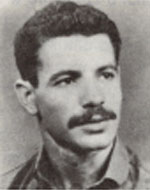Yehezkel, son of Salima and Salman, was born in October 1939 in Mosul, Iraq. He completed six years of elementary school in Iraq, and after his family immigrated to Israel in 1951 and settled in Kfar Hassidim, he continued his elementary studies. In Kfar Hassidim, a small family lived in unbearable conditions. In the summer there was a suffocating heat in their barracks, and in winter the rain dripped into their beds, and there seemed to be no roof over their heads. The economic situation worsened every day, until Yechezkel was forced to leave school and go to work in the kibbutzim in the area to help support the family. Four years later, the family managed to move from the camp to settle in Haifa. Yehezkel continued to work in various places during the day, and in the evening he studied the framework profession. During this period he began working in the framework of the Haifa police workshop and soon acquired the basics of the profession. Rannem, as he called all loved and read many books on various subjects. He also ran every morning before work, for health and for his enjoyment. About a year before his enlistment in the IDF, he went to the Gadna training course at Hanita, and when he returned he guided the youth in his neighborhood. He was friendly and friendly, always trying to help others as much as he could and was loved by all his acquaintances and friends. Yehezkel was drafted into the IDF in mid-November 1956 and volunteered for the Paratroopers Brigade, where he was sent to a paramedics course and then to an ambulance driver’s course, and eventually became a combat medic. After a while he left his job with the police and became a subcontractor for framework, he was an excellent professional and every job he took on himself was meticulous and meticulous in his treatment of his workers. In 1966 he married his girlfriend Sarah and established a family with her During the first day of the fighting, his unit encountered a heavy battle in the Old City, and Yechezkel drove the ambulance into the area of fire and under heavy shelling and flat-fire fire rescued his injured comrades and transferred them to a safe place “The courage, the dedication and the brotherhood that Yehezkel discovered in this battle, he was awarded the” Medal of Honor “by the head of the IDF General Staff. A month after the end of the Six-Day War, his firstborn son was born. A year later, his second son was born, and four years later his first daughter was born. He was an exemplary husband and father, dedicated and caring for his family. When he was forced to work far away from home, he always tried to return home in the evenings to be with his family. When the Yom Kippur War broke out, Yehezkel did not wait for the order. He went to Sinai and joined his unit. On the 21st of Tishrei 5734 (October 21, 1973), after his unit crossed the Suez Canal and moved to the West Bank, the Egyptians began heavy shelling. Yehezkel was killed in the shelling. He was laid to rest in the military cemetery in Haifa. He left behind a wife, two sons and a daughter, parents, seven brothers and a sister. After being shot down, he was given the rank of sergeant. In a letter of condolence to the bereaved family, his commander wrote: “Yechezkel was taken from us on the night of October 20, in a grove, opposite the place where our division of the Suez Canal succeeded, and we lost one of the best and oldest members of our unit. , And in the same way, Yehezkel discovered all those manifestations of volunteerism, resourcefulness, energy and authority that so characterized him and that we loved him.In the battles there were a number of times we thought to leave him with the rear force,And planted our confidence in him, with whom everything would turn out well, and we never failed. A dear friend is lost to us and we will remember him forever. “
